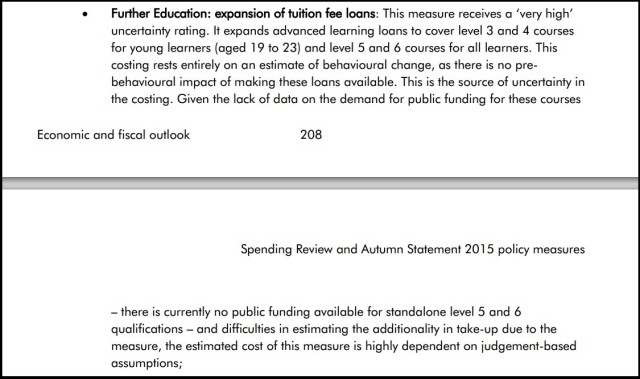Chancellor George Osborne’s extension of the FE loans system to 19 to 23-year-olds is a source of just as much uncertainty among his officials as his £360m savings plans are among sector leaders, government papers have revealed.

Mr Osborne made passing mention of the loans move in his Budget speech to MPs on Wednesday (November 25), with more details laid out in The Treasury’s Spending Review and Autumn Statement Blue Book.
It explains that “government will expand tuition fee loans to 19 to 23-year-olds at levels three and four, and 19+ year-olds at levels five and six” — but government policy costings reveal the “measure receives a ‘very high’ uncertainty rating”.
“Given the lack of data on the demand for public funding for these courses — there is currently no public funding available for standalone level five and six qualifications — and difficulties in estimating the additionality in take-up due to the measure, the estimated cost of this measure is highly dependent on judgement-based assumptions.”

Government figures published last month show the total amount awarded for 24+ advanced learning loans in 2014/15 was £149m, which was 62 per cent less than the £397m allocated for the FE loans budget.
And with the failed apprentice FE loans system, widely regarded as to blame for a sharp fall in adult apprenticeship numbers under the Coalition, still fresh in FE minds, the National Institute for Adult and Continuing Education (Niace) warned of expansion consequences.
David Hughes, Niace chief executive, said: “Extending eligibility of learning loans to younger learners and to higher level learning could easily exacerbate market failures in the 24+ advanced learning loan system.”
There was further uncertainty as to where £360m of adults skills “efficiencies and savings” by 2019-20 sat with the Chancellor’s pledge to protect funding for the “core adult skills participation budgets in cash terms, at £1.5bn”.
“We will not, as many predicted, cut core adult skills funding for FE colleges” Mr Osborne told MPs.
The news appeared even more positive with a Department for Business, Innovation and Skills spokesperson telling FE Week that funding of the loans extension would not eat into the £1.5bn.
However, the government’s spending review document makes it clear that not all areas of skills funding would be protected as “savings will be made from non-participation budgets”.
Dr Sue Pember, director of policy and external relations at Holex, said: “We are very pleased the government has acknowledged the importance of adult education. Of course we would like to know the detail of the proposed cuts to the non-participation budgets.”
Mr Hughes said: “It’s unclear which budgets are included and which aren’t. What are the implications for community learning and offender learning? What’s happening to learner support and additional learning support? I need more detail.”
Meanwhile, the UK Commission for Employment and Skills (UKCES) will be one source of adult skills saving with a Treasury spokesperson telling FE Week she “believed” it would “cease” from 2016/17, although a Department for Business, Innovation and Skills spokesperson was unable to confirm whether it would survive.
Martin Doel, Association of Colleges chief executive, said: “Following a massive 28 per cent cut to the adult skills budget earlier this year we had real concerns for the future of this essential training that provides the nation’s future workforce including nurses, social care workers and construction workers.
“It is a positive step in the right direction that Mr Osborne has chosen to spare the adult skills budget.
“Enabling 19-year-olds to access FE loans will also provide additional support for this vital training.”
Association of Employment and Learning Providers chief executive Stewart Segal said the budget was “not as bad as some were predicting,” but he too had questions.
“It appears that the overall budget of £1.5bn will be ‘protected’. This may still mean that within the budget some provision will not be funded, for example, some of the co-funded vocational skills for those who are employed may be at risk,” he said.
A spokesperson for the UKCES said that the Chancellor’s announcement would “have a significant impact” on the organisation, but was unable to confirm what that impact would be.
The spokesperson said the UKCES was “awaiting further details” and would work with government to manage any changes.
“It would be inappropriate to comment further at this time,” the spokesperson added.
Click here for budget analysis by Shadow Skills Minister Gordon Marsden, here for a loans extension piece by education consultant Mike Farmer, and here FE Commissioner adviser Mark Dawe’s view of the Budget.
Main image: Dominic Lipinski/PA Wire/Press Association Images
Clarity needed over £160m savings from 16-19 funding
Sector leaders have called for clarity around funding for 16 to 19-year-old learners amid concerns over £160m of cuts outside the now-protected national base rate.
Funding for 16 and 17-year-olds at £4,000 per learner and £3,300 for 18-year-olds will be protected in cash terms over the course of the parliament, Chancellor George Osborne announced.
But details included in the full spending review document raised the threat of cuts outside of this national base rate.
A Treasury spokesperson told FE Week some savings would “equate to around £160m from 2019-20 across 16-19 participation and participation support budgets which include the gradual removal of Formula Protection Funding from 2016/17”.
He added: “Some savings will naturally be made due to declining 16-19 budget demographics over this Parliament.”
A Department for Education spokesperson declined to comment further.
James Kewin, deputy chief executive of the Sixth Form Colleges’ Association, said colleges had already known that formula protection funding would end.
“If they have to find these additional targeted savings, what will they be?” he asked.
“We look forward to seeing the finer detail of this announcement and await confi rmation that there will not be reductions in other areas of 16 to 19 education such as funding for disadvantaged students or 18-year-olds.”
“Maintaining the funding base rate for 16 to 19-year-olds until 2020 will be welcomed, but with declining student numbers and funding being maintained only in cash terms this will lead to a signifi cant reduction in income to all colleges over the next four years,” said Mike Cheetham, a partner at audit firm RSM.
“Perhaps this is why sixth form colleges are being given the ‘option of joining a multi-academy trust’.”
Editor’s comment
Budget bonanza or blues?
On the morning of the Budget the Guardian front page memorably predicted significant cuts to FE funding.
Yet listening to the Chancellor that afternoon it would be easy to conclude the FE sector got an eleventh hour reprieve.
Adult funding allocations and the 16-19 funding rate is to be protected for the next four years and the 0.5 per cent apprenticeship levy by 2019-20 would be adding £900m to the annual pot.
Credit should be given to those who lobbied hard to save FE, although the surprise upturn in the macro-economic forecasts were also clearly a contributing factor.
But cash protection still means cuts in real terms, and not everything in FE is protected.
The DfE needs to secure £160m savings in 16-19 funding and BIS has £360m to find.
Also, loans are being extended, adults skills funding is being devolved and apprenticeship allocations are replaced by a voucher system.
So lots of unanswered questions, uncertainty for all FE providers and a long way from the ‘stability’ our sector deserves.
FE seems to have dodged a bullet, but it may turn out to be a boomerang.
Chris Henwood
chris.henwood@feweek.co.uk








The quote in the text box above from the official publication about FE Loans actually comes from the Office of Budget Responsibility not the Treasury. What the OBR actually said was ‘we have judged eight measures in the Treasury’s scorecard to have ‘high’ uncertainty around the central costing. One financial transaction was judged to have ‘very high’ uncertainty’ (which was the expansion of FE loans). The OBR appears to judge the expansion to Levels 5 and 6 in particular as highly uncertain. I came to the same conclusion quite independently – honest!